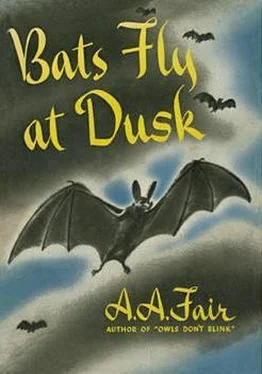A. A. Fair
Bats Fly at Dusk
The sign on the door said Cool & Lam, Confidential Investigations. But the blind man couldn’t see the sign. The elevator starter had given him the room number, and the tapping cane, starting with the first door at the corner of the corridor, had patiently counted the doors until the frail, bony silhouette was etched in black against the frosted glass of the entrance office.
Elsie Brand looked up from her typewriting, saw the thin, old man, the heavy, dark glasses, the striped cane, and the tray with the neckties, the lead pencils, and the tin cup. Her fingers ceased pounding the keyboard.
The blind man spoke before she had a chance to say anything. “Mrs. Cool.”
“Busy.”
“I’ll wait.”
“It won’t do any good.”
For a moment, the man seemed puzzled; then a wan smile tugged at the hollowed cheeks. “It’s about business,” he said, and after a half-second, added, “I have money.”
Elsie Brand said, “That’s different.” She reached for the telephone, thought better of it, kicked her chair back from the typewriter desk, swivelled around, said, “Wait a minute,” and crossed the office to open the door marked B. Cool, Private.
Bertha Cool, somewhere in the fifties, a hundred and sixty-five pounds of cold realism, sat in the big swivel chair at the desk and regarded Elsie Brand with grey-eyed skepticism.
“Well, what is it?”
“A blind man.”
“Young or old?”
“Old. A street vendor with a tray of neckties, a tin cup, and—”
“Throw him out.”
“He wants to see you — on business.”
“Any money?”
“He says he has.”
“What sort of business?”
“He didn’t say.”
Bertha’s eyes glittered at Elsie Brand. “Show him in. What the hell are you standing there for? If he’s got business and he has money, what more do we want?”
Elsie said, “I just wanted to make certain,” and opened the door. “Come in,” she said to the blind man.
The cane tapped its way across the office, entered Bertha’s inner sanctum. Once inside the room, the man paused inquiringly, holding his head cocked slightly on one side, listening intently.
His keen ears caught the sound of some slight motion Bertha made. He turned toward her as though he could see her, bowed, and said, “Good morning, Mrs. Cool.”
“Sit down,” Bertha said. “Elsie get that chair out for him. That’s fine. That’s all, Elsie. Sit down, Mr. What’s your name?”
“Kosling. Rodney Kosling.”
“All right, sit down. I’m Bertha Cool.”
“Yes, I know. Where is the young man who works with you, Mrs. Cool? Donald Lam, I believe his name is.”
Bertha’s face became grimly savage. “Damn him!” she sputtered.
“Where is he?”
“In the Navy.”
“Oh.”
“He enlisted,” Bertha said. “I had things fixed so he was deferred — took a war contract just to have something that would beat the draft. Worked things slick as a whistle; got him classified as an indispensable worker in an essential industry — and then, the damn little runt goes and enlists in the Navy.”
“I miss him,” Kosling said simply.
Bertha frowned at him. “You miss him? I didn’t know that you knew him.”
He smiled slightly. “I think I know every one of the regulars.”
“What do you mean?”
“My station is down half a block in front of the bank building on the corner.”
“That’s right. Come to think of it, I’ve seen you there.”
“I know almost everyone that passes.”
“Oh,” Bertha said, “I see,” and laughed.
“No, no,” he corrected her hastily. “It isn’t that. I really am blind. It’s the steps I can tell.”
“You mean you can recognize the steps of different people out of a whole crowd?”
“Of course,” Kosling said simply. “People walk as distinctively as they do anything else. The length of steps, the rapidity of the steps, the little dragging of the heels, the— Oh, there are a dozen things. And then, of course, I occasionally hear their voices. Voices help a lot. You and Mr. Lam, for instance, were nearly always talking as you walked past. That is, you were. You were asking him questions about the cases he was working on when you’d go to work in the morning, and at night you’d be urging him to speed things up and get results for the clients. He rarely said much.”
“He didn’t need to,” Bertha grunted. “Brainiest little cuss I ever got hold of — but erratic. Going out and joining the Navy shows the crazy streak in him. All settled down with a deferred rating, making good money, just recently taken into the business as a full partner — and he goes and joins the Navy.”
“He felt his country needed him.”
Bertha said grimly, “And I feel that I need him.”
“I always liked him,” the blind man said. “He was thoughtful and considerate. Guess he was pretty well up against it when he started with you, wasn’t he?”
“He was so hungry,” Bertha said, “his belt buckle was cutting its initials in his backbone. I took him in, gave him a chance to earn a decent living; then he worked his way into the partnership, and then — and then he goes away and leaves me flat.”
Kosling’s voice was reminiscent. “Even when he was pretty well down on his luck, he’d always have a pleasant word for me. Then when he began to get a little money, he started dropping coins — but he never dropped coins when you were with him. When he dropped money, he wouldn’t speak to me.” The blind man smiled reminiscently, and then went on, “As though I didn’t know who he was. I knew his step as well as I knew his voice, but he thought it would embarrass me less if I didn’t know who was making the donation — as though a beggar had any pride left. When a man starts begging, he takes money from anyone who will give it to him.”
Bertha Cool straightened up behind the desk. “All right,” she said crisply. “Speaking of money, what do you want?”
“I want you to find a girl.”
“Who is she?”
“I don’t know her name.”
“What does she look like? Oh, I’m sorry.”
“It’s all right,” the blind man said. “Here’s all I know about her. She works within a radius of three blocks from here. It’s a well-paid job. She’s about twenty-five or twenty-six. She’s slender, weighs about a hundred and six or a hundred and seven pounds, and is about five feet four inches tall.”
“How do you know all that?” Bertha asked.
“My ears tell me.”
“Your ears don’t tell you where she works,” Bertha said.
“Oh yes, they do.”
“I’ll bite,” Bertha said. “What’s the gag?”
“No gag. I always know what time it is on the hour. There’s a clock that chimes the hours.”
“What’s that got to do with it?”
“She’d walk past me anywhere from five minutes of nine to about three minutes of nine. When she walked by about three minutes of nine, she’d be walking fast. At five minutes of nine, she’d be walking more slowly. The jobs that start at nine o’clock are the better class of jobs. Most stenographic jobs in the district start at eight-thirty. I can tell about how old she is from her voice; how tall she is from the length of her steps; and what she weighs from the sound of her feet on the sidewalk. You’d be surprised at what your ears will tell you when you really learn to rely on them.”
Bertha Cool thought that over for a moment, then said, “Yes, I guess so.”
“When you go blind,” Kosling explained, “you either feel that you’re shut away from the world, can’t take part in life, and lose interest in it; or you keep an interest in life, and decide you’re going to get along with what you have, and make the best of it. You’ve probably noticed that people know a lot about the things they’re interested in.”
Читать дальше









